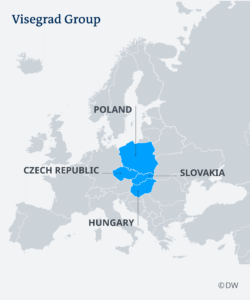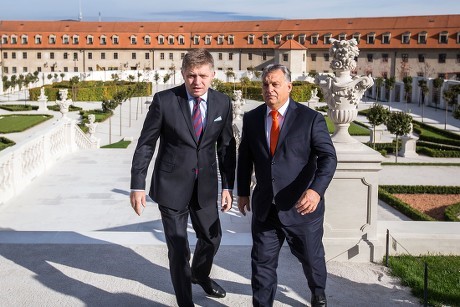Hungarian President Viktor Orbán and Slovakian President Robert Fico share a unified stance against providing military aid to Ukraine.
Fico, particularly disturbed by discussions among European leaders in Paris, including French President Emmanuel Macron’s openness to deploying Western troops in Ukraine, described the meeting’s atmosphere as bellicose.
Join us on Telegram: https://t.me/tfiglobal
He highlighted the potential for heightened tensions should EU or NATO forces be stationed in Ukraine. Furthermore, Fico criticized the European Union’s approach, suggesting it leans more towards perpetuating conflict rather than employing diplomacy to secure a ceasefire, thereby exacerbating the confrontation between Slavic nations.
The statements and stance of Hungary and Slovakia greatly enraged Poland and Czech Republic. The reason why these countries are important is because these two countries along with Hungary and Slovakia form the powerful Central European group called Visegrad V4.

The Visegrád Group (V4), comprising the Czech Republic, Poland, Hungary, and Slovakia, faced potential rifts over differing stances on Ukraine, as pointed out by the Czech and Polish prime ministers. Since the election of Petr Fiala’s government in the Czech Republic in 2021, which is known for its liberal orientation, there has been a notable strain in relations within the V4, especially with Hungary’s conservative government. This tension has been further compounded by the election of Donald Tusk in Poland, whose leftist-liberal government seeks closer alignment with European Union policies, diverging from Hungary’s approach.
The situation has led to a noticeable lack of cooperation, evidenced by the absence of a V4 heads of government meeting since the Czech Republic took over the rotating presidency of the group last summer. Petr Fiala, signaling a departure from traditional diplomatic engagements, remarked in January that convening such a meeting was unnecessary given the current dynamics at the European Council.
Read More: Orbán Shakes Up Brussels: Fidesz Ready to Rock with Conservatives!
Before the crucial meeting on Tuesday, the atmosphere among the Visegrád Group (V4) members—Poland, Czech Republic, Hungary, and Slovakia—was charged with anticipation and concern, hinting at potential discord. Statements from Polish and Czech leaders suggested the possibility of the V4 nearing a breaking point. The Polish Prime Minister openly questioned the future relevance of the V4, citing mixed messages from Budapest and Bratislava regarding their positions on Putin and Russia. Donald Tusk, on a similar note, vowed to confront Viktor Orbán directly, urging Hungary to unequivocally support Ukraine to maintain its standing within the EU and NATO frameworks.
Czech Prime Minister Petr Fiala expressed his reluctance to engage with Orbán and Fico, reflecting the strained relations within the group. In contrast, Hungarian Foreign Minister Péter Szijjártó emphasized the need for Central European solidarity through a social media post. He advocated for the group’s collaboration to counteract unfavorable EU decisions, prevent the forced distribution of migrants among member states, protect regional agriculture from the influx of cheap Ukrainian grain, avoid unnecessary tax increases, and resist ideological bias against nuclear energy. This pre-meeting bravado underscored the divergent views within the V4, setting the stage for a consequential dialogue on the future direction and unity of the group.
Following their meeting in Prague on Tuesday, February 27th, leaders of the Visegrád Group (V4) nations—Czech Republic, Poland, Hungary, and Slovakia—acknowledged existing tensions within the alliance yet expressed a shared optimism for future collaboration on mutual interests. Despite diverging views on Russia’s actions in Ukraine and the nature of support to be provided to Ukraine, there was a consensus on the value of unity in areas where collective strength is evident.
Czech Prime Minister Petr Fiala highlighted the differences in perspectives regarding the conflict in Ukraine and the assistance offered by the V4 countries. However, there was a newfound respect and acceptance for Hungary and Slovakia’s stance against providing military aid.
Read More: Orbán’s Game-Changer: The Unseen Move Shaking Up Europe!
Polish Prime Minister Donald Tusk conveyed a moderate optimism post-discussion, emphasizing the potential for cooperation on shared concerns and objectives.
Slovakian Prime Minister Robert Fico pointed towards a forward-looking approach, underlining the importance of focusing on the future beyond the current disagreements.
Hungarian Prime Minister Viktor Orbán recognized the collective interests that bind the four nations, affirming the strength derived from their united front within the European Union.
So it seems Orbán and Fico have made converts out of Fiala and Tusk and that is no mean feat. While Orbán is the wily fox, Fico seems to be a Honey Badger, who doesn’t give two hoots about what the EU says. And the EU has been provoking Fico in every possible way.








